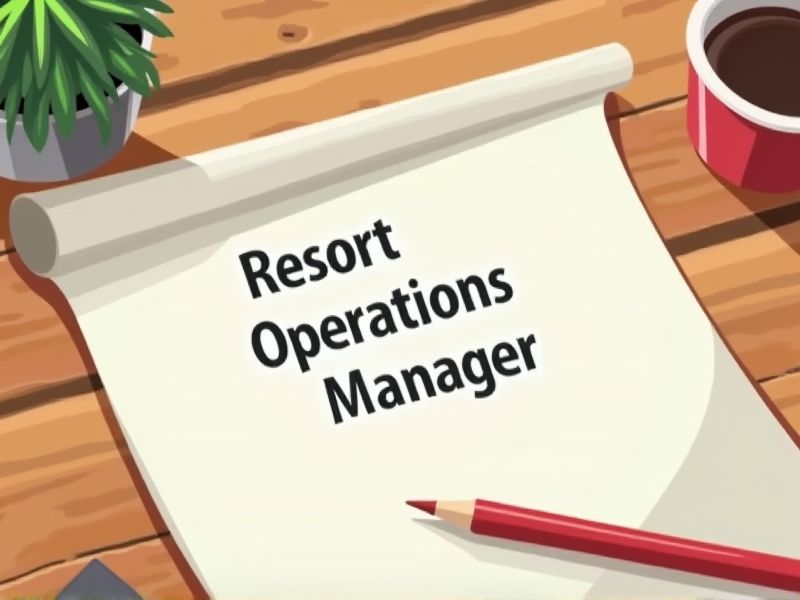
The role of a Resort Operations Manager involves overseeing various departments, ensuring seamless coordination and guest satisfaction. Certifications provide the essential knowledge and skills needed to manage complex operational challenges effectively. With industry-specific credentials, managers can enhance credibility, improve safety standards, and drive operational efficiency. Here are some important certifications you may need as a Resort Operations Manager.
Certified Hotel Administrator (CHA)
A Certified Hotel Administrator (CHA) credential provides a Resort Operations Manager with a recognized standard of excellence, ensuring they possess the necessary knowledge and skills to oversee complex resort operations efficiently. Holding a CHA demonstrates a commitment to professional growth and continuous learning, which can improve managerial effectiveness and staff training methods. It often leads to enhanced customer satisfaction, as the CHA emphasizes best practices in guest services and operational management. In the competitive hospitality industry, having a CHA can differentiate a Resort Operations Manager, helping attract and retain qualified staff and loyal guests.
Certified Food & Beverage Executive (CFBE)
Certified Food & Beverage Executives (CFBE) are needed for Resort Operations Managers due to their specialized knowledge in managing complex food and beverage operations efficiently. Their certification ensures a deep understanding of industry standards, leading to improved quality and consistency in service. CFBE holders bring enhanced strategic decision-making abilities, crucial for maximizing profitability and guest satisfaction. They also play a key role in implementing innovative practices that can elevate a resort's competitive edge in the hospitality market.
Certified Hospitality Supervisor (CHS)
A Certified Hospitality Supervisor (CHS) enhances a Resort Operations Manager's skills by providing a standardized framework for effective team leadership and guest satisfaction strategies. Obtaining CHS certification equips the manager with advanced communication and problem-solving techniques crucial for maintaining high operational standards. The credential demonstrates a commitment to professional development, which can improve staff morale and retention. Hiring or training managers with CHS certification often leads to increased efficiency and a more cohesive resort environment.
ServSafe Manager Certification
The ServSafe Manager Certification ensures Resort Operations Managers are equipped with essential food safety knowledge, preventing foodborne illnesses. This certification demonstrates their commitment to high operational standards, improving guest trust and satisfaction. It also aids in complying with local and federal health regulations, thereby minimizing legal risks. Employees often look up to certified managers for guidance, fostering a culture of safety and responsibility within the team.
Certified Lodging Professional (CLP)
Certified Lodging Professional (CLP) credentials provide evidence of advanced knowledge and skills critical for effective resort management. The CLP program equips Resort Operations Managers with industry-best practices that enhance operational efficiency. Managers with CLP certification demonstrate a commitment to professional development, which can elevate the resort's reputation in a competitive market. Knowledge gained through CLP training aids in better decision-making and improved guest satisfaction.
Certified Meeting Professional (CMP)
Having a Certified Meeting Professional (CMP) enhances a Resort Operations Manager's credibility among peers and clients, as the CMP designation is recognized globally. The CMP knowledge base equips the manager with advanced skills in planning and executing complex meetings and events, which directly improves resort offerings. This credential facilitates better communication with event planners and organizers, ensuring a seamless guest experience. Higher competency from CMP-certified managers often leads to increased client satisfaction and repeat business, driving the resort's revenue growth.
Certified Hospitality Revenue Manager (CHRM)
A Certified Hospitality Revenue Manager (CHRM) is essential for a Resort Operations Manager because they specialize in optimizing pricing strategies, which leads to increased revenue. Their expertise in demand forecasting helps resorts allocate resources more efficiently, enhancing guest satisfaction. By analyzing market trends and competitor behavior, CHRMs enable resorts to make informed decisions regarding promotional efforts and occupancy rates. Integrating revenue management principles ensures that the resort can maintain financial stability while adapting to changing market conditions.
Certified Resort Manager (CRM)
A Certified Resort Manager (CRM) provides specialized knowledge in areas essential for efficient resort operations, leading to enhanced guest satisfaction and revenue management. This certification reinforces an Operations Manager's capability to streamline operational processes and improve service quality, reducing operational costs. Accreditation ensures that managers are equipped with up-to-date industry standards and best practices, contributing to more effective crisis management and operational planning. Holding a CRM credential elevates the professional stature of a Resort Operations Manager, making the resort more competitive in an increasingly demanding hospitality market.
National Restaurant Association ProStart Food Safety Manager Certification
Having the National Restaurant Association ProStart Food Safety Manager Certification equips a Resort Operations Manager with essential knowledge to maintain high food safety standards. This certification helps in safeguarding guests' health by implementing critical food handling procedures. It also enhances the resort's reputation for adhering to industry-leading food safety practices. By minimizing food safety risks, the resort can potentially avoid costly legal issues related to foodborne illnesses.
Project Management Professional (PMP)
Obtaining a Project Management Professional (PMP) certification equips a Resort Operations Manager with structured methodologies crucial for overseeing complex projects within the hospitality industry. Applying PMP principles enhances resource allocation efficiency, leading to cost optimization and improved guest experiences. Experience in PMP-driven planning and risk management enables proactive identification and mitigation of operational challenges. Mastery of PMP guidelines fosters communication and collaboration among diverse teams, increasing overall productivity.
Summary
As a reader searching for results of a Resort Operations Manager obtaining certifications, you might expect improvements in operational efficiency and guest satisfaction. Certifications can provide managers with advanced skills and updated knowledge pertinent to industry standards. Enhanced problem-solving abilities and strategic planning are likely outcomes, leading to smoother resort operations. You may also notice an increase in staff productivity and morale due to improved leadership capabilities.
